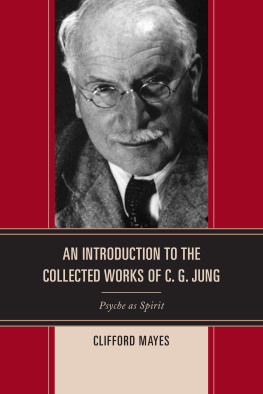B O L L I N G E N S E R I E S X X

THE COLLECTED WORKS
OF
C. G. JUNG
VOLUME 3
EDITORS
SIR HERBERT READ
MICHAEL FORDHAM, M.D., M.R.C.P.
GERHARD ADLER, PH.D.
WILLIAM MCGUIRE, executive editor
THE
PSYCHOGENESIS
OF MENTAL
DISEASE
C. G. JUNG

TRANSLATED BY R. F. C. HULL
B O L L I N G E N S E R I E S X X


COPYRIGHT 1960 BY BOLLINGEN FOUNDATION, NEW YORK, N. Y.
PUBLISHED BY PRINCETON UNIVERSITY PRESS
PRINCETN, N. J.
Second printing, with corrections and minor revisions, 1972
Third printing, 1976
First Princeton / Bollingen Paperback printing, 1982
THIS EDITION IS BEING PUBLISHED IN THE UNITED STATES OF AMERICA BY PRINCETON UNIVERSITY PRESS AND IN ENGLAND BY ROUTLEDGE AND KEGAN PAUL, LTD. IN THE AMERICAN EDITION, ALL THE VOLUMES COMPRISING THE COLLECTED WORKS CONSTITUTE NUMBER XX IN BOLLINGEN SERIES. THE PRESENT VOLUME IS NUMBER 3 OF THE COLLECTED WORKS AND WAS THE TENTH TO APPEAR.
LIBRARY OF CONGRESS CATALOGUE CARD NUMBER: 75156
ISBN 0-691-09769-0
ISBN 0-691-01859-6 (pbk.)
MANUFACTURED IN THE UNITED STATES OF AMERICA
EDITORIAL NOTE
The importance of this volume of scientific papers for understanding Jungs researches as a whole can scarcely be overrated, even though most of them are now mainly of historical interest or represent the reflections of his later years on a subject that never ceased to engage his active psychotherapeutic endeavours.
The Psychology of Dementia Praecox was the culmination of Jungs early researches at the Burghlzli Hospital into the nature of the psychoses. It was the publication which established him once and for all as a psychiatric investigator of the first rank. It was the volume which engaged Freuds interest and led to their meeting. It was the research which contained the seeds of his theoretical divergence from psychoanalysis.
Jungs work on the manifestations of schizophrenia was a potent factor in the development of his theory of psychic energy and of the archetypes. He believed that, in order to account for the imagery, splitting processes, and defect in the sense of reality observable in this disease, neither the sexual theory of libido, which leads to the concept of narcissism, nor personal and genetic study is adequate. In short, the theory of archetypes becomes indispensable.
Jung was indeed one of the first to employ individual psychotherapy with schizophrenic patients. Not only this: there are clear indications in this volume of how early in this century he investigated the relationship between mental hospital administration and the course of the supposed disease-process. His Swiss forerunners, Forel and Bleuler, both men with intense psychological interests, also realized this, and the Burghlzli team did much pioneering work in changing the hospital atmosphere. Today this understanding is being gradually applied with the good results that Jung anticipated.
It may be regretted that there is no more in this volume about the psychotherapy of schizophrenia. Why is it that Jung did not write more on this subject? The answer is given in one of his later essays, Recent Thoughts on Schizophrenia, where he states that in spite of all the developments over the years, knowledge of this disorder is still so fragmentary that he could organize his findings only in outline and in relation to individual case-studies.
The volume is divided into four parts based on their chronological sequence, except that On Psychological Understanding has been placed after The Content of the Psychoses. Though written as separate essays the two were later combined in this way by the author in both Swiss and English publications of these works.
EDITORIAL NOTE TO THE SECOND PRINTING
Because of the availability of Experimental Researches, Volume 2 in the Collected Works, the copious references herein to Jungs papers on the word-association tests have been revised in terms of that volume. Changes of terminology and other minor revisions of text, bibliography, and index have been made.
TABLE OF CONTENTS
Translated from ber die Psychologie der Dementia praecox: Ein Versuch (Halle a. S., 1907).
Translated from Der Inhalt der Psychose (2nd edn., Leipzig and Vienna, 1914).
Translated from the Supplement to the foregoing.
Translated from a critique in the Jahrbuch fr psychoanalytische und psychopathologische Forschungen (Vienna and Leipzig), III (1911).
Written in English and published in the British Medical Journal (London), II (1914).
Written in English and published in the Proceedings of the Royal Society of Medicine (London), XII (1919).
Translated from Heilbare Geisteskranke?, Berliner Tageblatt, 1928.
Written in English and published in the Journal of Mental Science (London), LXXXV (1939).
Written in English and broadcast by the Voice of America, December 1956.
Translated from Die Schizophrenia, Schweizer Archiv fr Neurologie und Psychiatrie (Zurich), LXXXI (1958).
I
THE PSYCHOLOGY OF DEMENTIA PRAECOX
[First published as ber die Psychologie der Dementia praecox: Ein Versuch (Halle a. S., 1907). Translated, and with an introduction, by Frederick W. Peterson and A. A. Brill, under the present title, in the Nervous and Mental Disease Monograph Series (no. 3; New York, 1909). Retranslated in the same series by A. A. Brill alone, with a new introduction (New York and Washington, 1936). Now newly translated from the original. The 1936 Brill translation has been consulted.E DITORS .]
FOREWORD
This work is the fruit of three years experimental researches and clinical observations. In view of the complexity and magnitude of the material, my work cannot and does not lay claim either to finality of treatment or to absolute certainty of the statements and conclusions. On the contrary, it combines all the disadvantages of eclecticism, which to many a reader may seem so striking that he will call my work a confession of faith rather than a scientific treatise. Peu importe! The important thing is that I should be able to show the reader how, through psychological investigation, I have been led to certain views which I think will provoke new and fruitful questions concerning the individual psychological basis of dementia praecox.
My views are not contrivances of a roving fancy, but thoughts which matured in almost daily conversation with my respected chief, Professor Bleuler. I owe special thanks to my friend Dr. Riklin, of Rheinau, for adding considerably to the empirical material. Even a superficial glance at my work will show how much I am indebted to the brilliant discoveries of Freud. As Freud has not yet received the recognition and appreciation he deserves, but is still opposed even in the most authoritative circles, I hope I may be allowed to define my position towards him. My attention was drawn to Freud by the first book of his I happened to read,
Next page










